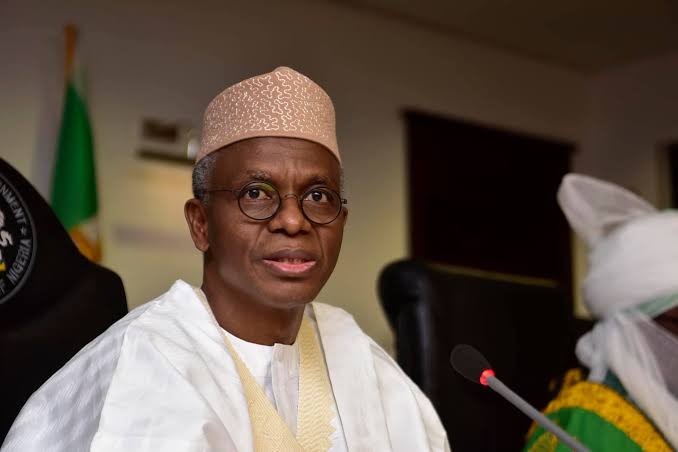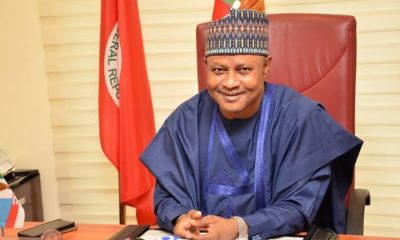Politics
El-Rufa’i Reveals Kaduna State’s Financial Liabilities At Inauguration Ceremony

During the inauguration ceremony of the new Governor, Senator Uba Sani at the Murtala Square in Kaduna, former Governor Nasir Ahmad El-Rufa’i revealed the financial liabilities of Kaduna State as of the last financial year.
According to him, the state had N64.54 billion in domestic debt, N16.06 billion in other contingent liabilities, and a foreign debt amounting to US $577.32 million.
El-Rufa’i said “we have spent N818.9bn as capital expenditure between 2015 and 2022 in the prosecution of our first and second State Development Plans, attracting nearly US $5bn in foreign and domestic investments that created jobs, improved our tax receipts and laid a solid foundation for the future.”
In his remarks he said “I wish to express my gratitude to the people of Kaduna State for the support they have provided me as their governor over the last eight years. I thank them for twice electing me to this office, and for the prayers, advice and counsel they have offered us.
“At every step of the way during this journey of service, I have been able to count on the support and understanding of the people. In good times and in challenging moments, your support has buoyed us to serve you to the best of our ability. We have had to take difficult decisions, and most of our people have often understood that those steps were taken to uphold the common good. We are immensely grateful to the residents of our state.
“As we conclude our period of service, I am confident that we have made Kaduna State a better place than we met it. We have made Kaduna State proud as an investment destination, a place of innovation in governance reforms and a state of equal opportunity for all who call it home. Our Kaduna is a state where every resident is a citizen.
“We have made Kaduna State better prepared to address the challenges of today and tomorrow, and to harness the opportunities that are emerging. We have expanded access to education and health care. We have reformed our public school system to deliver free education for every child until they complete senior secondary school.
“We have placed primary health care at the heart of our health care delivery strategy. I am proud that we have guaranteed every child in Kaduna State the chance to climb the ladder of social mobility that a decent education and access to affordable health care offer. We have improved the chances of every child surviving infancy. We have reduced the chances that a woman would die from the perils of pregnancy.
“Our appointments have shown that we value women and youths. We believe that we have a duty to carry every segment of society along in governance. We initiated programmes to empower people, but we have rejected any attempt to create, foster or exploit dependence. We provide for our pensioners; we were the first state to pay the new minimum wage and we wish that we can pay our public servants even better than that.
“Under our watch, we have digitised the land registry, and laid the foundations for an efficient and fair tax system. We have built a government machinery that asserts the imperative of supporting business. We are changing perceptions and reorienting minds about the proper role of government in promoting social and economic development.
“We have put the people first as we promised. We have created metropolitan authorities to manage our cities and we have built more markets to expand access to commercial opportunities.
“I thank the people for supporting the delivery of the urban renewal projects for the benefit of the entire state. Many of our people have borne the inconveniences of construction, including longer commuting times, the removal of some buildings, adjustment of fence lines and other attachments in the public interest.
“Several have been constructive in their attitude to matters of compensation and in reporting saboteurs. We remain grateful to them all.
“Our government worked hard to firmly confront the security challenges that emerged. The measures we took ensured that we did not record any statewide crisis over the last eight years. We expanded the security footprint in the state, ensuring that more military bases and police divisions were established.
“We harnessed soft measures, like creating the Peace Commission, and we created a dedicated Ministry of Internal Security. We foresaw that banditry could mutate into a terrible menace. We galvanised neighbouring states for collaborative action to address the problem right from 2015.
“In 2017, I requested the Federal Government to designate the emerging banditry as an insurgency and to unleash on them the full weight of the military. Sadly, this was not done until 2022 acting upon the declaration of the Federal High Court.
“It is a matter for regret that the Federal Government did not appreciate the gravity of the problem until banditry had wreaked so much havoc to the lives, liberty and the livelihoods of so many people. Although coordinated military action began later in 2022, the job remains incomplete.
“I therefore urge the incoming government to sustain the pressure on the bandits, insurgents and terrorists and make the military action comprehensive and simultaneous across the seven frontline states, six in the Northwest and Niger, that are most impacted.
“As we complete our tenure, we have not relented in removing as many security threats as we can in order to help clear the deck for the incoming government.
“We have taken action against groups and individuals that are engaged in acts that are inimical to peace and lawful order in the state. We are removing the properties of identified sponsors of terrorism and those of unlawful societies that have been proscribed in this state.
“We have insisted on the primacy of law and order, and on asserting the prerogatives of the State in guaranteeing life and liberty. On security, I can say that we did all that is within the powers of a subnational to do, and resisted pressure to negotiate with or pay off the criminals.
“We are leaving behind a net cash balance in our Treasury Single Account of about N5bn after deductions for the payment of salaries, pensions and dues to the Local Government Councils, and US $2.05m in our Domiciliary Account as of yesterday 28th May 2023.
“Kaduna State has receivables for reimbursements of infrastructure and security spending from the Federal Government amounting to about N41bn, that will be paid to the state in due course.
“This does not include the sums due to the State as share of the accumulated stamp duties receipts, estimated at over N100bn, that the incoming government will certainly receive before the end of this year. I am therefore optimistic that the incoming government will in due course be in a position to settle all inherited liabilities, complete ongoing projects and initiate new ones by the Grace of God.
“We governed under very difficult fiscal circumstances, surviving two recessions, collapses of crude oil prices, the Covid-19 pandemic and the impact of the Russia-Ukraine war. We therefore had to borrow extensively to spend our way out of recession and pursue our ambition to make Kaduna great again.
“As at the last financial year, Kaduna State has the following Domestic debt of N64.54bn, Other Contingent Liabilities of N16.06b and Foreign debts US of $577.32m.
“We have spent N818.9bn as capital expenditure between 2015 and 2022 in the prosecution of our first and second State Development Plans, attracting nearly US $5bn in foreign and domestic investments that created jobs, improved our tax receipts and laid a solid foundation for the future.
“I pay tribute to the extraordinary work of our team in the Kaduna State Government. The Deputy Governor, the members of the State House of Assembly, our honourable Judges, Kadis, and magistrates, our commissioners, Permanent Secretaries, Local Government chairmen, special advisers, assistants and other government officials have displayed imagination and demonstrated commitment to help the Kaduna State Government to achieve set objectives, and I applaud them for living up to their oaths of office.
“Our traditional rulers and religious leaders have been exceptional partners in mobilising the populace to understand our policies and support our efforts. Our partners in civil society have been critical in enabling the government to appreciate the concerns of citizens without a voice.
“Yesterday, I completed the administrative handover to my worthy successor, Distinguished Senator Uba Sani, and his able Deputy, Dr. Hadiza Sabuwa Balarabe. I call on the people of Kaduna State to support him and his team as he leads the next government. With your votes, you have vested in him the future direction of the state. Let us all pray for him to succeed in the service of the state and its people beyond our hopes and imagination.
“Several members of our governing team broke down in tears at the valedictory session of the Executive Council, overwhelmed by the reality of saying goodbye.
“But goodbyes are not necessarily bad. In fact, goodbyes are part of the order of nature. Everything that has a beginning must have an end. One era ends and another begins. New leaders take charge and life continues. That is the cycle of life. Our duty is to keep hope alive and do our best, and leave the rest to Almighty God.
“On my way to this inauguration, I entered the office of the Governor to leave on his desk a fold with three messages – a print of Desiderata by Max Ehlichmann, published in 1927, and the letter of the Fourth Rightly-Guided Caliph, Sayyidina Ali ibn Abu Talib, to Malik Ashtar when appointed the Governor of Syria over 1,000 years ago.
“The third is a hand-written note from me with some thoughts as he settles down to continue the leadership journey.
“My brother and friend, I commiserate with you. You have a huge task ahead but I am confident you will be luckier in the next eight years than I have been in the last eight years. Remember, you cannot do this job alone. Your team, if competent and capable, will focus on delivering results and little else.
“If you are unlucky enough to choose people you like that have no capacity, they will resort to blaming every other person for failures than the real culprit, which is the team itself. Be careful to watch out for this.
“May the Almighty continue to protect the people of Kaduna State. May He bless our endeavours and shower on this land peace, progress and prosperity. Farewell, thank you and God bless.
Politics
Buhari Calls For Transparency Ahead Of Katsina LG Elections

Former President, Muhammadu Buhari has called for transparency and accountability in the upcoming local government elections in Katsina State.
Speaking during the All Progressives Congress (APC) caucus meeting on Saturday at the Presidential Banquet Hall in the Katsina Government House, Buhari emphasized the importance of these principles in maintaining public trust and political relevance.
“Transparency and accountability are the cornerstones of good governance and are fundamental to sustaining the confidence of the people,” Buhari said.
READ ALSO: Counsel To Otudeko Protests Alleged N12.3bn Fraud Charges
Governor Dikko Radda also addressed party stakeholders at the meeting, urging them to mobilize support at the grassroots level and work towards securing a decisive victory for the APC.
“We are committed to conducting elections that reflect the true will of the people,” Radda stated, highlighting the party’s focus on ensuring transparent, inclusive, and democratic processes.
The governor also underscored Katsina’s political significance, referencing his leadership journey under Buhari’s administration and the recognition the state has received in the form of ministerial and federal appointments under President Bola Tinubu’s government.
In his opening remarks, APC Chairman in Katsina State, Sani Daura, described the caucus meeting as a platform to strengthen party unity and strategize for the elections. He commended Buhari and other stakeholders for their commitment to the party’s success.
Prominent political figures from Katsina, including Senators Abu Ibrahim, Abdulaziz Yar’Adua, Muntari Dandutse, and Nasiru Sani Zangon Daura, were present at the meeting, further underscoring its significance in the lead-up to the elections.
The APC leadership reiterated its commitment to upholding democratic values and ensuring that the local government elections truly reflect the will of the people.
Politics
Leadership Newspaper Backs Adeleke For Second Tenure, Names Him ‘Gov Of The Year’

It was a plethora of pleasantries in Osogbo on Thursday, when Osun State Governor, Senator Ademola Adeleke was named 2024 Governor of the year and endorsed for second tenure in office by the top management of the Leadership Newspaper.
The newspaper’s team was on a courtesy call on Gov Adeleke, Biztellers reports.
Receiving them at the Government House, Gov Adeleke noted that his administration had reduced the infra deficit by over 40 percent.
He added that his administration had also bridged access to primary health care, with an ambition to expand health access at medium and tertiary levels.
He said, “Osun State is constantly getting recognitions for what outsiders and even opposition members regard as our commendable performance.
“In the last one year, our government has been conferred with several awards across the sectors. Aside from reputable newspapers like the leadership stable, we have received accolades from several federal agencies and non-governmental bodies. The consensus from those reviewing our performance and service delivery is that we are true agents of good governance.
“In all these positive ratings, my response has always been to task my team to double their efforts. In the face of overwhelming positive reviews and high approval ratings, I am compelled to drive my team harder. When recently, some opposition figures confessed to our positive ratings, I still believe we have a lot of grounds to cover.
“I am not allowing the praises to enter my head. While it may be true that I have delivered a four-year task in under two years, I am propelled to do more because Osun has been left behind on many fronts. As I have reduced the infra deficit by over 40 percent, my real target Is higher. As I have bridged access to primary health care, my ambition is to also expand health access at medium and tertiary levels. While our records across the sectors are laudable as your newspaper has acknowledged, the ultimate goal is to accelerate infra upgrade alongside the boosting of soft investment for the well-being of our people.
ALSO READ: Lawmaker Introduces Bill To Allow Trump A Third Presidential Run
“I appreciate your candid endorsement of our performance. It is important to note that your yardstick for recognizing us correlates with similar reasons adduced by others. Our huge governance records are undeniable facts especially in workers’ welfare, infrastructure delivery, educational expansion, health care access improvement, solid mineral sector reforms, digital economy initiatives, agricultural mechanisation among others.
“I want to assure the public that our administration is not slowing down. Very soon, I will flag off ongoing remodeling of Osogbo stadium to assume international standard. Prior to the ongoing stadium project, we have engineered the creation of Osun Sport Commission and Osun Sport Fund through appropriate legal and policy framework.
“Very soon, I will be flagging off the dualisation of phase one of Odoori – Post office road at Iwo. The contractor for Iwo -Osogbo road has mobilized to site. We plan to complete the two projects within the life of this administration. Meanwhile, the dualisation project at Ilesa is progressing while the flyover bridge at Ile Ife is ongoing with appreciable progress. 2025 is billed to be a year of further expansion of good governance for the good of man and humanity.
On his part, the Vice Chairman of Leadership Group Mike Okpere, noted that the recognition is in order to give Gov Adeleke an insight and encouragement to do a second term.
“Your excellency you will see that, we didn’t just come down here, we had a meeting before the award and that is why we are here, so this trip is to notify you formally for this award and we personally invite you on the 8th of April at the Banquet Hall of the State House in Asokoro where this award will be handed on over to you.
“Our Reputable Person of the Year is Aliko Dangote, you all are aware of the investment he just concluded, by bringing fuel production into Nigeria, because of that and many other things, we chose him as our person of the year.
“Other person’s that would be sharing the merit are other governors that have touched people’s lives, among them is the Governor from Akwa Ibom State, the Governor of Enugu State, the Governor of Jigawa State and the Governor of Kano State.
“We didn’t call this Leadership Governor of the year, we call it Governor of the year, in other words, what we are saying is that, this recognition will give you an insight and encouragement to do a second term.
“As a newspaper company, we don’t endorse Governors but when we see something we say it, your Excellency sir, I therefore want to present this notification and official invitation”, he added.
Other members of the Leadership Newspaper team includes, Abraham Nda Isaiah, Director, Leadership Group, Ibidiran Ayokunle, Head Southern Operations, Joshua Dada, Osun State.
Politics
C’River Assembly Moves To Amend LG Law, Proposes More Political Appointments

The Cross River State House of Assembly has initiated the process to amend the Local Government Law 2007, introducing provisions to expand political appointments and enhance local government administration across the state.
The bill, sponsored by Rt. Hon. Davies Etta, representing Abi State Constituency, was debated on Tuesday in Calabar.
It proposes increasing the number of appointees in each Local Government Area (LGA) to 50. Among the new roles are 16 Special Adviser positions and a cadre of officials known as Ward Relation Officers.
According to the bill, “The Chairman of Council may appoint such a number of Special Advisers to assist him in the discharge of his duties, provided that appointments, when added to other statutory appointments, shall not exceed a total number of 50.”
The proposed Ward Relation Officers will hold ranks equivalent to Special Advisers and will report directly to the Chairmen of their respective LGAs.
This move, the Assembly says, is aimed at fostering grassroots engagement and improving governance at the local level.
Another key provision of the bill seeks to elevate the office of the Head of Local Government Administration (HOLGA) to the status of a Permanent Secretary within the state public service.
The amendment stipulates that HOLGAs will enjoy all the rights, privileges, and entitlements of Permanent Secretaries, including pensions.
“The office of the HOLGA shall be equivalent to the office of a Permanent Secretary of the State Public Service and shall enjoy all rights and privileges of the Permanent Secretary, including pensions,” the bill states.
It also specifies that appointments to the HOLGA position must be made exclusively from within the local government service in the state.
The bill, which has passed its first and second readings, has been referred to a joint committee on Local Government Affairs, Judiciary, and Public Accounts for further review and consultations with stakeholders.
Speaker of the Assembly, Rt. Hon. Elvert Ayambem, underscored the importance of the proposed amendment, noting that it would strengthen local government administration and improve service delivery to the grassroots.
The Assembly is expected to hold further deliberations before making a final decision on the proposed amendments.


















